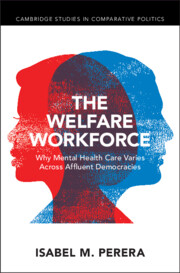Acknowledgments
Since that fateful evening in Philadelphia, this project has benefited from over a decade of guidance, feedback, and assistance from others. Thanks go first to Julia Lynch, my doctoral advisor at Penn, whose exacting standards and singular energy pushed the research to new heights. Well-timed conversations with my formal committee members, Dawn Teele and Marie Gottschalk, as well as my acting supervisors while abroad, Jane Gingrich and Desmond King, also played significant roles at pivotal moments in graduate school. A postdoctoral fellowship with Dominic Sisti at Penn’s medical school then opened doors to audiences and opportunities beyond my expectations.
Nor did I expect that the scholars I had read and admired as a student would eventually become my faculty colleagues. But that is what happened when I joined Cornell. Suzanne Mettler has provided outstanding mentorship at every step of the publication process. Sidney Tarrow reviewed the entire manuscript with characteristic generosity and insight. Feedback from Peter Katzenstein on Chapter 1, Richard Bensel and Nicolas van de Walle on Chapter 3, Jamila Michener on Chapter 7, and Gustavo Flores-Macías and Tom Pepinsky on the proposal were targeted interventions with a very big impact. Thanks also go to Rachel Reidl, who sought out a wonderful writing space for me; and to Jill Frank, Jason Frank, and Ken Roberts, the department chairs who ensured a productive research environment.
Essential to this book’s completion were several other institutional homes and intellectual communities. Special thanks go to Henri Bergeron for securing the sponsorship of Sciences Po Paris (twice) and to Johannes Lindvall for that of the University of Gothenburg. I also benefited from extended visits to the University of Oxford, the European University Institute, and the Brocher Foundation. Along the way, many additional scholars propelled the project to its final form. In particular, Chapter 5 gained from a helpful discussion with Matthias Brunn, Elisa Chelle, Lucie Kraepiel, Takuya Onoda, and Tonya Tartour, and from comments from Anton Hemerijck; and it remains indebted to Alex Barnard, my fortuitous fieldwork partner. Chapter 6 emerged from the advice of Andrea Campbell and Peter Swenson and materialized with the guidance of Karen Anderson, Frida Boräng, Carl Dahlström, and Jon Pierre.
My academic preoccupation with the costs of labor-intensive work is partially the product of a lived reality. Time, travel, and other assistance for this research was funded by: Cornell University (the Department of Government, the Institute for European Studies, the Qualitative and Interpretive Research Institute, the Humanities Council, and the Toward an Open Monograph Ecosystem [TOME] Initiative); the University of Pennsylvania (the Fontaine, GAPSA-Provost, School of Arts and Sciences Dissertation Research, Mellon Graduate Education, Queen Elizabeth, and Fox Leadership International Alumni Research and Service [FLIARS] fellowships, the Browne and Lauder Centers, and the Department of Medical Ethics and Health Policy); the European University Institute Max Weber Fellowship Program; the Embassy of France in the United States Chateaubriand Program; the Sciences Po Laboratory for Interdisciplinary Evaluation of Public Policies (LIEPP) International Scholars in Policy Evaluation Program; the Société des professeurs français et francophones d’Amérique; the Brocher Foundation Residency Program; and the Horowitz Foundation for Social Policy. These resources made it possible for Josette Barrans, Trevor Brown, Daniel Carelli, Catherine Hendicott, Frida Jonsson, Alyson Price, Samantha Surdek, Aiysha Varraich, and especially, Pia Kohler to contribute their research and editorial assistance as well.
Countless others devoted their valuable time to this project, too. Interviewees and area specialists shared their knowledge and resources; François Chapireau even procured obscure administrative documents when no one else could and then offered feedback on the manuscript. Archivists and librarians provided skilled source assistance; in fact, Stefanie Caloia cannot be thanked enough for making the unprocessed AFSCME collections available to me. Administrators at multiple institutions helped to execute this complex international project; for which Dinnie Sloman and Laurie Dorsey at Cornell graciously bore the brunt of the logistics. Many good friends accompanied me on this long road; so much so that Danielle Hanley, Tanguy Hubert, and André Victor Doherty Luduvice found themselves providing direct technical and project management support at various points.
Finally, the confidence of my family carried this book from inception to completion. My grandmothers, Bohemia Perera and Mary Solernou, who just missed its publication, know that I often thought of my late grandfathers, Dr. Faustino Perera, Sr. and Dr. Emilio Solernou, Sr., while researching this topic. Their faith in me – and (crucially) that of my uncle, Emilio Solernou, Jr. – never faltered. Above all, I thank my parents, Mariloly Solernou and Tino Perera, the two public sector employees who have influenced me the most.
Note on Book
Publication of this open monograph was the result of Cornell University’s participation in TOME, a collaboration of the Association of American Universities, the Association of University Presses, and the Association of Research Libraries. TOME aims to expand the reach of long-form humanities and social science scholarship, including digital scholarship. Additionally, the program looks to ensure the sustainability of university press monograph publishing by supporting the highest quality scholarship and promoting a new ecology of scholarly publishing in which authors’ institutions bear the publication costs.
Funding from Cornell University made it possible to open this publication to the world.
Nothing herein set forth shall serve in any way to alter the original Agreement except as specified above. To the extent any terms or conditions of the Agreement conflict with or are inconsistent with this Amendment, the terms of this Amendment will prevail. In agreeing to the terms of this Amendment, both parties accept the terms of the Creative Commons license assigned to the work, as set forth on the Creative Commons website (https://creativecommons.org/licenses/).

